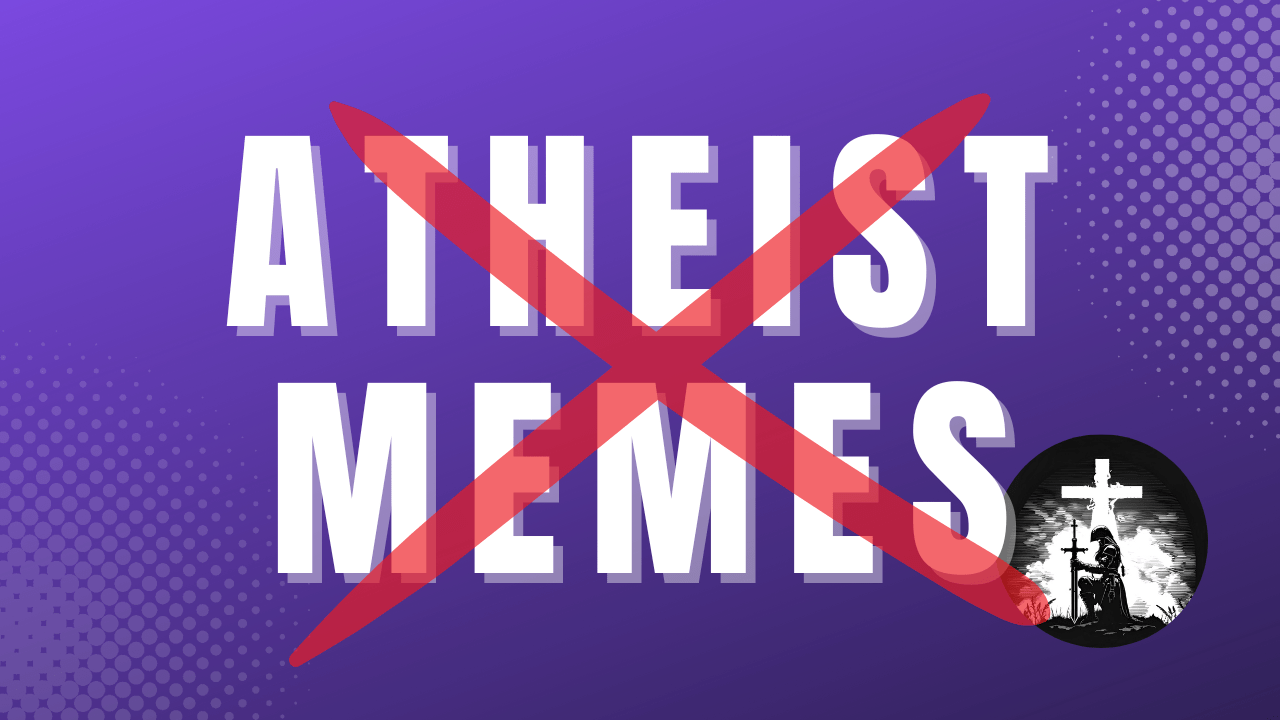In this article, we are going to learn how to respond to memes that atheists often share to denigrate our faith. It is important that we know how to respond because memes are powerful tools for spreading messages. This particular meme contains several fallacies that we will debunk today.
The meme portrays Jesus knocking on a door and saying, “Let me in,” “Why?” “So I can save you,” “From what?” “From what I will do to you if you don’t let me in.”

Let’s address each fallacy present in this meme one by one:
Misinterpretation of Jesus’ message:
The meme depicts Jesus as threatening and coercive, suggesting that He will harm or punish those who do not let Him in. This distorts Jesus’ message in the Bible. Jesus’ invitation to “let me in” is an invitation to experience His love, grace, and salvation, not a threat of harm.
God’s love and respect for free will:
Throughout the Bible, God consistently respects our free will and allows us to choose whether to accept Him or not. He desires a loving relationship with us but will not force us. The meme overlooks the fact that God grants us the freedom to accept or reject Him.
Salvation from sin and its consequences:
When Jesus speaks of saving us, He refers to saving us from the consequences of sin. As human beings, we are prone to sin and its detrimental effects. Jesus offers salvation through His sacrifice on the cross, providing forgiveness and eternal life. His desire is to save us from the destructive nature of sin, not to inflict harm upon us.
- Separation from God: Sin creates a separation between human beings and God. Isaiah 59:2 states, “But your iniquities have made a separation between you and your God, and your sins have hidden his face from you so that he does not hear.” Sin distances us from communion and closeness with our Creator.
- Spiritual death: Romans 6:23 declares, “For the wages of sin is death.” Sin brings about spiritual death, a separation from the abundant life that God desires for us.
- Personal and social consequences: Sin can also have negative personal and social consequences. The Bible shows how sin can lead to conflicts, oppression, pain, and suffering at both individual and collective levels. For example, Proverbs 13:15 says, “Good sense wins favor, but the way of the treacherous is their ruin.”
- Slavery to sin: Jesus Himself speaks of the slavery of sin in John 8:34, saying, “Truly, truly, I say to you, everyone who practices sin is a slave to sin.” Sin can become a chain that binds us and prevents us from living in freedom.
- Loss of blessings and spiritual inheritance: Sin can deprive us of the blessings and spiritual inheritance that God has for us. Galatians 5:19-21 mentions works of the flesh, which are manifestations of sin, and warns that those who practice such things will not inherit the kingdom of God.
Mercy and compassion of God:
The meme fails to acknowledge God’s infinite mercy and compassion. Jesus came to Earth not to condemn but to save (John 3:17-18). “For God did not send his Son into the world to condemn the world, but to save the world through him. Whoever believes in him is not condemned, but whoever does not believe stands condemned already because they have not believed in the name of God’s one and only Son.” His purpose was to offer redemption and reconcile us with God, not to cause harm. He offers a path to eternal life through faith and trust in Him, not through fear or coercion.
In conclusion, the meme demonstrates a lack of understanding of God’s plan from the unbelievers who have freely chosen not to believe in Jesus Christ and the Holy Scriptures. As Catholics, it is our duty to give reasons for our hope and to be consistent with Jesus’ message. This way, we will persevere in faith and not allow doubts to taint our hearts, which ultimately is what the evil one seeks when spreading his lies.
“But in your hearts revere Christ as Lord. Always be prepared to give an answer to everyone who asks you to give the reason for the hope that you have. But do this with gentleness and respect.” 1 Peter 3:15

